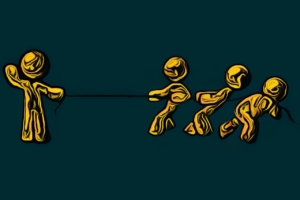Why Is America So Politically Polarized?

It’s widely acknowledged that our nation is bitterly divided — by party, by issues, by approach, and by willingness to communicate effectively with people who hold differing opinions.
What’s less agreed-upon is why this is the case, and what it’s going to take to get back on track.
We sat down with one of our founders, Erik Olsen, for his thoughts, based upon his perspective as a political thought leader and economist.
Q: When did you start feeling this polarization really taking hold?
EO: In 2009, my cofounder Bruce Bond and I came up with concept for Common Ground Committee because we were noticing that the tone of public discourse was becoming more vitriolic and offensive. I’ve been a fan of Jonathan Haidt’s book THE RIGHTEOUS MIND, and one of the things he recognizes is that people have become more tribal — they look at people close to them and say, If you don’t share my belief system then there’s something wrong with you. People have become less reflective and self-examining.
Q: Why do you think this happened?
EO: It’s hard to say. We’ve evolved with the internet in the last 20-15 years, and you can’t deny the way it’s encouraged this kind of behavior for a variety of reasons. In part it’s because there’s relative anonymity in saying things you’d never say to someone’s face; the internet makes it easy to engage that way. It has contributed to our becoming more polarized in part because it made it easier to argue anonymously.
I got on Facebook in 2007 really as a mechanism for getting in touch with friends all around the country, and I renewed a lot of friendships from my high school and college days. What was very curious is that as the years went by, I noticed people were becoming more and more political, and I was kind of astonished at the ferocity of their political beliefs. I too have strong views, but they could be characterized as free market views. Working at Common Ground Committee has made me be more thoughtful about my own biases, and say, Ok, I can have more confidence in views backed up by my own research and study, but I have to recognize where I don’t have an omniscient knowledge base. Yet I see people talk in strident terms about things they don’t have any particular authority in, with strong views devolving into a kind of derision, or anger, or vituperativeness. You might have a valid opinion, but the way you’re representing your point doesn’t support your argument. Instead, it relies on screeds. You’re not convincing anyone when you’re talking trash.
Q: How would you suggest the internet could be used for more productive discussions?
EO: Conceptually, the internet is stunning, in terms of its usefulness. We’ve all become rather jaded with it, but I think back to high school and what I could have done with the internet for access to research and learning. We look at the internet now and we curse it because it’s feeding back to us the kind of things we want to hear. I just find it interesting that we’re not more intelligent about the way we use it — a caustic environment instead of a learning tool. One of the things I find interesting is that you can start going so far down into practically doctorate-level research based on a tweet. Someone says, This is the way the world is, and I say, That’s not the way the world is, the world is this way, and then they provide their evidence, and I provide my evidence. I like to look at their evidence, and I to see if their side has validity or not. But I don’t know that other people follow through that way.
Q: To what extent do you think it’s due to our current political leadership?
EO: In the last four years in particular many people have focused on Donald Trump as a source of polarization. But I strongly believe he isn’t a source of polarization — he’s a symptom. To a certain extent, he’s speaking for people who feel they’ve lost their voice because of the way media has evolved on cable — that is becoming I think becoming even more biased as time goes on, with news organizations becoming more focused on particular opinions. And I think Donald Trump gives voice to people who think their voice is missing from the public stage. They, for their own reasons, get a thrill out of the way he seems to tweak the establishment’s nose. None of that is contributing to a useful or meaningful dialogue. Its’ not about finding the truth, it’s about what zinger can you come up with to fight with people. It doesn’t make for good governance and doesn’t make for good discourse.
Read Part 2 of our interview series, “Why Is America So Politically Polarized?”





